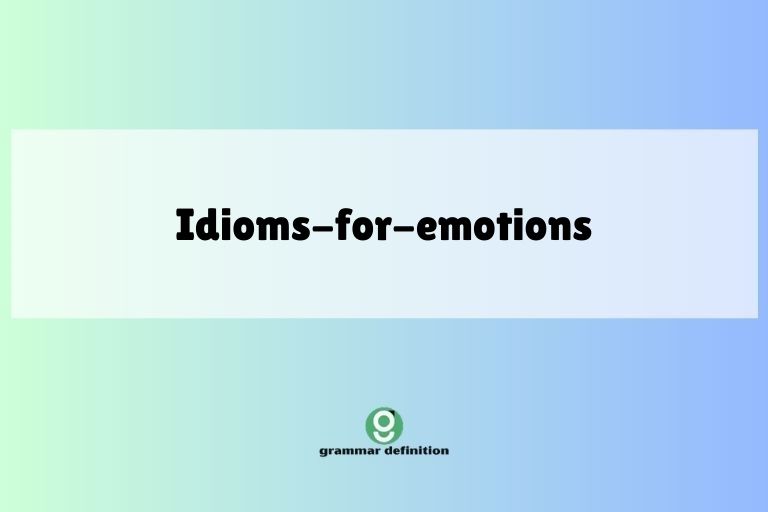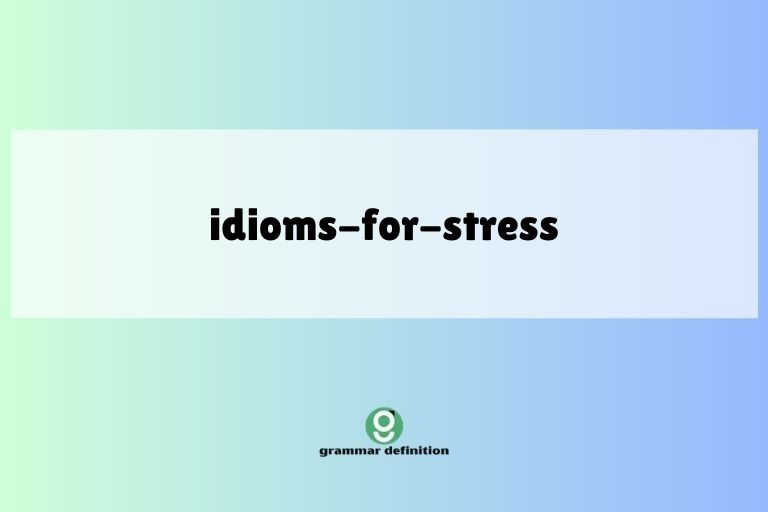Crack the Code: Mastering Idioms for English Fluency

Idioms are the secret sauce of the English language, adding flavor and color to everyday conversations and writing. While grammar rules provide the structure, idioms bring the language to life.
Understanding and using idioms effectively can significantly boost your comprehension and fluency, making you sound more natural and confident. This article is designed to help English learners of all levels unlock the power of idioms, providing definitions, examples, usage rules, and practice exercises to master this essential aspect of English.
This comprehensive guide is ideal for ESL/EFL students, language teachers, and anyone looking to enhance their English language skills. By the end of this article, you’ll have a solid grasp of common idioms, their meanings, and how to use them correctly in various contexts.
Table of Contents
- Introduction
- What are Idioms?
- Structural Breakdown of Idioms
- Types of Idioms
- Examples of Common Idioms
- Usage Rules for Idioms
- Common Mistakes with Idioms
- Practice Exercises
- Advanced Topics in Idioms
- Frequently Asked Questions (FAQ)
- Conclusion
What are Idioms?
An idiom is a phrase or expression whose meaning cannot be understood from the literal meanings of its individual words. In other words, it’s a saying where the words together have a meaning that is different from the dictionary definitions of the individual words.
Idioms are a vital part of any language, especially English, and they add color, depth, and nuance to communication. They often reflect cultural values, historical events, or common experiences.
Understanding idioms is crucial for comprehending spoken and written English and for communicating effectively with native speakers.
Idioms can be classified based on their function and the type of words they contain. They can act as verbs, nouns, adjectives, or adverbs within a sentence.
The context in which an idiom is used is extremely important, as the same phrase can have different meanings in different situations. Mastering idioms involves not only memorizing their meanings but also understanding how to use them appropriately in various contexts.
Structural Breakdown of Idioms
Idioms often follow specific structural patterns, although these patterns are not always consistent. Some idioms are fixed expressions, meaning their words cannot be changed without altering the meaning or making the idiom sound unnatural.
Others are more flexible, allowing for some variation in tense or number. Understanding these structural elements can help learners recognize and use idioms more effectively.
Here’s a breakdown of common structural elements found in idioms:
- Verbs: Many idioms contain verbs that carry the main action or state of being. Examples include “kick the bucket” (to die) and “break the ice” (to start a conversation).
- Nouns: Nouns often represent key concepts or objects within the idiom. For instance, in “a piece of cake” (something easy), “cake” represents the ease of the task.
- Prepositions: Prepositions frequently connect words and phrases within idioms, adding layers of meaning. Examples include “over the moon” (extremely happy) and “under the weather” (feeling ill).
- Adjectives: Adjectives can describe the qualities or characteristics associated with the idiom’s meaning. For example, “in the red” (in debt) uses “red” to symbolize financial loss.
- Articles: Articles like “a,” “an,” and “the” are often integral parts of idioms, contributing to their overall structure and meaning. Examples include “a drop in the bucket” (a small amount) and “the ball is in your court” (it’s your turn to act).
Types of Idioms
Idioms can be categorized based on their grammatical structure, function, or the type of imagery they evoke. Understanding these categories can help learners better recognize and use idioms in different contexts.
Verbal Idioms
Verbal idioms are phrases where the main verb carries a figurative meaning. These idioms often describe actions or states of being in a non-literal way.
Here is a table showcasing examples of verbal idioms:
| Idiom | Meaning | Example Sentence |
|---|---|---|
| Break the ice | To make a start by overcoming initial difficulties | He tried to break the ice by telling a joke. |
| Call it a day | To stop working on something | After working for ten hours, she decided to call it a day. |
| Get out of hand | To become uncontrollable | The party got out of hand, and the neighbors called the police. |
| Hit the nail on the head | To state something exactly right | You hit the nail on the head when you said the problem was lack of communication. |
| Jump the gun | To do something too early | They jumped the gun by announcing the deal before it was finalized. |
| Keep an eye on | To watch carefully | Could you keep an eye on my bag while I go to the restroom? |
| Let the cat out of the bag | To reveal a secret | She let the cat out of the bag about their surprise party. |
| Miss the boat | To miss an opportunity | If you don’t apply now, you’ll miss the boat. |
| Pull someone’s leg | To joke or tease someone | I’m just pulling your leg; I don’t really believe that. |
| See eye to eye | To agree with someone | They don’t see eye to eye on most issues. |
| Spill the beans | To reveal a secret | He spilled the beans about the surprise vacation. |
| Take with a grain of salt | To not take something too seriously | You should take his advice with a grain of salt; he’s not always right. |
| Tie the knot | To get married | They are planning to tie the knot next summer. |
| Turn a blind eye | To ignore something | The teacher decided to turn a blind eye to the students’ chatter. |
| Wrap your head around | To understand something complicated | I can’t quite wrap my head around this new concept. |
| Bite the bullet | To face a difficult situation with courage | I didn’t want to go to the dentist, but I had to bite the bullet. |
| Cut corners | To do something poorly in order to save money | The company cut corners on safety to increase profits. |
| Drive someone up the wall | To annoy someone greatly | My roommate’s loud music is driving me up the wall. |
| Face the music | To accept the consequences of one’s actions | He had to face the music after lying to his boss. |
| Get something off your chest | To talk about something that’s been bothering you | I needed to get it off my chest, so I told her everything. |
Prepositional Idioms
Prepositional idioms are phrases that include a preposition and have a meaning that is different from the literal meanings of the individual words. These idioms often describe relationships, directions, or states of being.
Here is a table showcasing examples of prepositional idioms:
| Idiom | Meaning | Example Sentence |
|---|---|---|
| On cloud nine | Extremely happy | She was on cloud nine after receiving the job offer. |
| Under the weather | Feeling ill | I’m feeling a bit under the weather today, so I’m staying home. |
| In the same boat | In the same situation | We’re all in the same boat when it comes to dealing with this problem. |
| Out of the blue | Unexpectedly | He called me out of the blue after many years. |
| Over the moon | Extremely happy | They were over the moon about their new baby. |
| Up in the air | Uncertain | Our travel plans are still up in the air. |
| Down to earth | Practical and realistic | She’s very down to earth despite her success. |
| In a nutshell | In summary | In a nutshell, the project was a success. |
| Off the top of my head | Without thinking carefully | Off the top of my head, I can’t remember the exact date. |
| Through thick and thin | During good times and bad times | We’ve been friends through thick and thin. |
| Ahead of the curve | More advanced than others | Our company is ahead of the curve in terms of technology. |
| Behind the scenes | Privately or secretly | A lot of work happens behind the scenes to make the event successful. |
| Beside the point | Irrelevant | That’s beside the point; we need to focus on the main issue. |
| In the long run | Eventually | In the long run, this investment will pay off. |
| On the ball | Alert and competent | She’s really on the ball; she always knows what’s going on. |
| Under pressure | Stressed | He works well under pressure. |
| With flying colors | With great success | She passed the exam with flying colors. |
| Out of order | Not working | The elevator is out of order. |
| In the dark | Uninformed | They kept me in the dark about their plans. |
| At the drop of a hat | Immediately, without hesitation | I’m ready to go at the drop of a hat. |
Binomial Idioms
Binomial idioms are phrases that consist of two words connected by a conjunction, usually “and” or “or.” The order of the words is typically fixed and cannot be reversed without sounding unnatural.
Here is a table showcasing examples of binomial idioms:
| Idiom | Meaning | Example Sentence |
|---|---|---|
| Black and white | Clear and straightforward | The rules are black and white; there’s no room for interpretation. |
| Pros and cons | Advantages and disadvantages | We need to weigh the pros and cons before making a decision. |
| Give and take | Compromise | Relationships require give and take from both partners. |
| Odds and ends | Small, miscellaneous items | I need to tidy up all the odds and ends in the drawer. |
| Peace and quiet | Calmness and tranquility | I just want some peace and quiet. |
| Safe and sound | Uninjured and unharmed | They arrived home safe and sound after the storm. |
| Sick and tired | Fed up with something | I’m sick and tired of your complaining. |
| By and large | Generally | By and large, the project was a success. |
| Now and then | Occasionally | We go out for dinner now and then. |
| Sooner or later | Eventually | Sooner or later, you’ll have to face the truth. |
| Back and forth | Moving in alternating directions | The discussion went back and forth without reaching a conclusion. |
| High and low | Everywhere | We searched high and low for the missing keys. |
| Loud and clear | Easily understood | I heard you loud and clear. |
| More or less | Approximately | It will cost more or less $100. |
| On and off | Intermittently | It rained on and off all day. |
| Touch and go | Uncertain outcome | The surgery was touch and go, but he pulled through. |
| Up and down | With fluctuations | The stock market went up and down all week. |
| Wear and tear | Damage from normal use | The furniture shows some wear and tear. |
| Life and death | A matter of critical importance | The doctor said it was a matter of life and death. |
| Hustle and bustle | Busy and energetic activity | I enjoy the hustle and bustle of the city. |
Cliche Idioms
Cliche idioms are phrases that have become overused and lost their original impact. While they are still idioms, they are often considered unoriginal or predictable.
However, they are still common and understanding them is important.
Here is a table showcasing examples of cliche idioms:
| Idiom | Meaning | Example Sentence |
|---|---|---|
| All that glitters is not gold | Appearances can be deceptive | He seemed rich, but all that glitters is not gold. |
| Better late than never | It’s better to do something late than not at all | I know I’m late, but better late than never. |
| Easy come, easy go | Something easily obtained is easily lost | He won the lottery, but easy come, easy go, he spent it all quickly. |
| Every cloud has a silver lining | There’s something positive in every bad situation | Even though you lost your job, remember every cloud has a silver lining. |
| Practice makes perfect | Regular practice leads to improvement | Don’t give up; practice makes perfect. |
| The early bird catches the worm | The person who arrives first has the best chance of success | I got here early because the early bird catches the worm. |
| Time heals all wounds | Emotional pain lessens with time | I know you’re hurting now, but time heals all wounds. |
| When it rains, it pours | When bad things happen, they happen all at once | First, I lost my job, then my car broke down; when it rains, it pours. |
| Actions speak louder than words | What someone does is more important than what they say | He says he cares, but actions speak louder than words. |
| Don’t count your chickens before they hatch | Don’t make plans based on something that hasn’t happened yet | They might not approve the loan, so don’t count your chickens before they hatch. |
| Honesty is the best policy | It’s always best to be truthful | I told him the truth because honesty is the best policy. |
| It’s not over until the fat lady sings | Don’t assume the outcome until it’s completely finished | They’re behind in the game, but it’s not over until the fat lady sings. |
| Look before you leap | Think carefully before taking action | Consider all the options; look before you leap. |
| Make hay while the sun shines | Take advantage of favorable conditions | We should finish the project now; make hay while the sun shines. |
| The grass is always greener on the other side | Other people’s situations seem better than your own | They think my job is great, but the grass is always greener on the other side. |
| Two wrongs don’t make a right | Responding to a wrong with another wrong doesn’t make it right | Don’t retaliate; two wrongs don’t make a right. |
| A penny saved is a penny earned | Saving money is as valuable as earning it | I try to save money because a penny saved is a penny earned. |
| Curiosity killed the cat | Being too inquisitive can lead to trouble | Stop asking so many questions; curiosity killed the cat. |
| When in Rome, do as the Romans do | Adapt to the customs of the place you’re in | I tried the local food because when in Rome, do as the Romans do. |
| You can’t have your cake and eat it too | You can’t enjoy the benefits of two conflicting choices | If you sell the house, you can’t live in it; you can’t have your cake and eat it too. |
Euphemistic Idioms
Euphemistic idioms are used to soften the impact of unpleasant or offensive topics. They allow speakers to discuss sensitive subjects in a more polite or indirect way.
Here is a table showcasing examples of euphemistic idioms:
| Idiom | Meaning | Example Sentence |
|---|---|---|
| Passed away | Died | Her grandfather passed away peacefully in his sleep. |
| Let go | Fired from a job | The company had to let go of several employees due to budget cuts. |
| Senior moments | Brief memory lapses, especially in older people | I’m having a lot of senior moments lately; I can’t remember where I put my keys. |
| Economical with the truth | Lying or not telling the whole truth | He was being economical with the truth when he said he didn’t know about the plan. |
| Comfort station | Public restroom | There’s a comfort station just around the corner. |
| Correctional facility | Prison | He was sent to a correctional facility for his crimes. |
| Between jobs | Unemployed | He’s between jobs at the moment. |
| Hearing impaired | Deaf or hard of hearing | The school has special programs for students who are hearing impaired. |
| Vertically challenged | Short in height | He might be vertically challenged, but he’s a great basketball player. |
| Previously owned | Used | I bought a previously owned car to save money. |
| Sleep together | Have sexual relations | They decided to sleep together after dating for a while. |
| In a family way | Pregnant | She’s in a family way and expecting a baby soon. |
| Restroom facilities | Toilets | The restroom facilities are located down the hall. |
| Passed on | Died | Her cat passed on after a long illness. |
| Put to sleep | Euthanized (an animal) | We had to put our dog to sleep because he was in so much pain. |
| Relocated | Fired | He was relocated to another company. |
| The birds and the bees | Explanation of sex and reproduction | My parents never gave me “the birds and the bees” talk. |
| With us no more | Died | He is with us no more, but we will always remember him. |
| Let go | Fired | Due to budget cuts, the company had to let go of several employees. |
| Well-upholstered | Overweight | She is a bit well-upholstered, but she’s very healthy. |
Examples of Common Idioms
Learning idioms requires exposure to a wide range of examples. The following tables provide numerous examples of common idioms, categorized by their general usage.
This table provides a broad selection of common idioms used in everyday conversation:
| Idiom | Meaning | Example Sentence |
|---|---|---|
| A piece of cake | Very easy | The exam was a piece of cake. |
| Cost an arm and a leg | Very expensive | That car cost an arm and a leg. |
| Once in a blue moon | Rarely | I only go to the movies once in a blue moon. |
| Raining cats and dogs | Raining heavily | It’s raining cats and dogs outside. |
| Bite off more than you can chew | To take on more than one can handle | He bit off more than he could chew when he volunteered for three projects. |
| Don’t put all your eggs in one basket | Don’t risk everything on one venture | You shouldn’t put all your eggs in one basket; diversify your investments. |
| Kill two birds with one stone | To accomplish two things at once | I can kill two birds with one stone by going to the store on my way home. |
| The best of both worlds | To have all the advantages | Living in the countryside offers the best of both worlds: peace and quiet with easy access to the city. |
| Add insult to injury | To make a bad situation worse | To add insult to injury, they charged me a late fee after losing my payment. |
| Barking up the wrong tree | To be mistaken or misguided | If you think he’s the culprit, you’re barking up the wrong tree. |
| Beat around the bush | To avoid talking directly about something | Stop beating around the bush and get to the point. |
| Better late than never | It’s better to do something late than not at all | I know I’m late, but better late than never. |
| Burn the midnight oil | To work late into the night | I had to burn the midnight oil to finish the project. |
| Catch someone red-handed | To catch someone in the act of doing something wrong | He was caught red-handed stealing the cookies. |
| Cut to the chase | To get to the point quickly | Let’s cut to the chase; what do you want? |
| Get something off your chest | To talk about something that’s been bothering you | I needed to get it off my chest, so I told her everything. |
| Hit the books | To study hard | I need to hit the books; my exam is tomorrow. |
| In hot water | In trouble | He’s in hot water with his boss for being late. |
| Jump on the bandwagon | To join a popular trend or activity | Everyone is jumping on the bandwagon and buying electric cars. |
| Keep your chin up | To stay positive and hopeful | Keep your chin up; things will get better. |
| Last straw | The final problem in a series of problems | His constant complaining was the last straw; I had to tell him to stop. |
| Make a long story short | To summarize quickly | To make a long story short, we won the game. |
| On the same page | In agreement or understanding | We need to make sure we’re on the same page before we start the project. |
| Pull yourself together | To calm down and regain control of your emotions | You need to pull yourself together and face the situation. |
| See the light | To understand something clearly | He finally saw the light and realized he was wrong. |
| Take it with a grain of salt | To not take something too seriously | You should take his advice with a grain of salt; he’s not always right. |
| Under the weather | Feeling ill | I’m feeling a bit under the weather today, so I’m staying home. |
| Walking on eggshells | Being very careful not to offend someone | I feel like I’m walking on eggshells around him because he’s so sensitive. |
Usage Rules for Idioms
Using idioms correctly requires attention to detail and an understanding of their nuances. Here are some key rules to keep in mind:
- Context is Key: Always consider the context in which you are using an idiom. The same idiom can have different meanings or connotations depending on the situation.
- Word Order: Many idioms have a fixed word order that cannot be changed. Altering the word order can make the idiom sound unnatural or change its meaning.
- Tense and Number: Some idioms allow for variations in tense and number, while others are more rigid. Pay attention to how the idiom is typically used and make adjustments accordingly.
- Formality: Be aware of the formality of the idiom. Some idioms are more appropriate for casual conversation, while others are suitable for formal writing or speaking.
- Cultural Sensitivity: Some idioms may be culturally specific and may not be understood by people from other cultures. Be mindful of your audience and avoid using idioms that may be offensive or confusing.
It’s also important to remember that idioms should be used sparingly. Overusing idioms can make your language sound unnatural or forced.
Use them strategically to add emphasis, color, or humor to your communication.
Common Mistakes with Idioms
One of the biggest challenges in learning idioms is avoiding common mistakes. Here are some frequent errors that English learners make:
- Literal Interpretation: Interpreting an idiom literally instead of understanding its figurative meaning.
- Incorrect Word Order: Changing the word order of a fixed idiom.
- Misusing Prepositions: Using the wrong preposition in a prepositional idiom.
- Overusing Idioms: Using too many idioms in a single conversation or piece of writing.
- Using Inappropriate Idioms: Using idioms that are too informal or culturally insensitive for the situation.
Here are some examples of common mistakes with idioms, along with the correct usage:
| Incorrect | Correct | Explanation |
|---|---|---|
| It’s raining dogs and cats. | It’s raining cats and dogs. | The correct word order is “cats and dogs.” |
| I have a bone to pick with you. | I have a bone to pick with you. | This idiom is correct as is. |
| He let the cat out from the bag. | He let the cat out of the bag. | The correct preposition is “of.” |
| She is feeling under the weather condition. | She is feeling under the weather. | The idiom is “under the weather,” not “under the weather condition.” |
| Don’t count your chickens before they are hatching. | Don’t count your chickens before they hatch. | The correct tense is “hatch.” |
| He was pulling my foot. | He was pulling my leg. | The correct word is “leg,” not “foot.” |
| We see eye on eye. | We see eye to eye. | The correct preposition is “to.” |
| I am in the same boat like you. | I am in the same boat as you. | The correct word is “as.” |
| He hit the nail in the head. | He hit the nail on the head. | The correct preposition is “on.” |
| She’s on cloud nine skies. | She’s on cloud nine. | The correct idiom is “on cloud nine.” |
Practice Exercises
Test your understanding of idioms with these exercises. Fill in the blanks with the correct idiom from the list provided.
Instructions: Choose the correct idiom from the list below to complete each sentence.
Idiom List:
- A piece of cake
- Break the ice
- Call it a day
- Hit the nail on the head
- Once in a blue moon
- Under the weather
- Spill the beans
- Miss the boat
- Keep an eye on
- In the same boat
- I’m feeling a bit __________, so I’m going to stay home and rest.
- This math problem is __________. I solved it in just a few minutes!
- We’re all __________ when it comes to dealing with these economic challenges.
- He __________ by revealing the surprise party plans.
- Let’s __________ and go home. We’ve been working for 10 hours straight.
- Could you __________ my luggage while I go to the restroom?
- If you don’t apply for the scholarship now, you’ll __________.
- They only visit us __________, maybe once every few years.
- He __________ when he said the key to success is hard work and dedication.
- To __________ at the awkward meeting, she told a funny joke.
Show Answers
- Under the weather
- A piece of cake
- In the same boat
- Spilled the beans
- Call it a day
- Keep an eye on
- Miss the boat
- Once in a blue moon
- Hit the nail on the head
- Break the ice
Instructions: Correct the idiom in each sentence if it is used incorrectly.
- He was barking at the wrong tree when he accused me of stealing his pen.
- I have to hit the books tonight because I have a big exam tomorrow.
- She was on cloud seven after getting engaged.
- Don’t cry over spilled milk; what’s done is done.
- They are in the same ship as us, dealing with the same problems.
Show Answers
- He was barking up the wrong tree when he accused me of stealing his pen.
- This sentence is correct.
- She was on cloud nine after getting engaged.
- This sentence is correct.
- They are in the same boat as us, dealing with the same problems.
Advanced Topics in Idioms
For advanced learners, exploring the nuances and origins of idioms can be a fascinating endeavor. Here are some advanced topics to delve into:
- Etymology of Idioms: Research the historical and cultural origins of specific idioms. Many idioms have interesting stories behind them that shed light on their meanings.
- Regional Variations: Explore how idioms vary across different English-speaking regions. Some idioms are specific to certain countries or dialects.
- Idioms in Literature: Analyze how idioms are used in literature to create vivid imagery, convey character traits, and enhance the overall impact of the writing.
- Creating Your Own Idioms: Experiment with creating your own idioms, keeping in mind the principles of figurative language and cultural relevance.
By exploring these advanced topics, you can deepen your understanding of idioms and develop a more sophisticated command of the English language.
Frequently Asked Questions (FAQ)
Why are idioms so difficult to learn?
Idioms are challenging because their meanings are not literal and often require cultural context. Memorizing them can be difficult, and using them correctly requires understanding their nuances and appropriate usage.
How can I improve my understanding of idioms?
Immerse yourself in the English language through reading, listening, and speaking. Pay attention to how native speakers use idioms in different contexts.
Keep a notebook of new idioms you encounter and practice using them in your own conversations and writing.
Are idioms important for passing English proficiency exams?
Yes, idioms are often included in English proficiency exams like TOEFL, IELTS, and Cambridge exams. A good understanding of idioms can improve your reading comprehension, listening skills, and overall language proficiency.
Is it okay to use idioms in formal writing?
It depends on the context and the specific idiom. Some idioms are appropriate for formal writing, while others are more suitable for casual conversation.
Be mindful of your audience and the tone of your writing.
How can I avoid making mistakes with idioms?
Pay close attention to the context in which you are using the idiom. Double-check the word order and preposition usage.
If you’re unsure about an idiom, it’s better to err on the side of caution and use a more straightforward expression.
Conclusion
Mastering idioms is an ongoing journey that requires dedication, practice, and a willingness to embrace the complexities of the English language. By understanding the definitions, usage rules, and common mistakes associated with idioms, you can significantly enhance your communication skills and achieve greater fluency.
So, dive in, explore the colorful world of idioms, and unlock the secret sauce of English!






